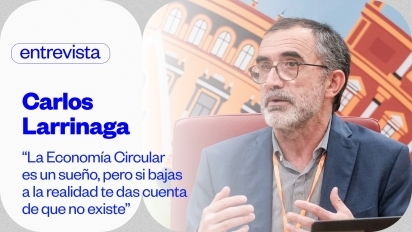“The bad thing about the circular economy is that it is sometimes used as a slogan to avoid making the changes needed”
“The circular economy has become a slogan. Sometimes one gets the impression that by speaking about the circular economy other things are left aside. Companies are told to improve their efficiency and to recycle, but these ideas are nothing new. What is really needed is a rethink of the entire economic system. Back in the 1980s people spoke about natural capitalism or factor four. That is all very well, but not much has been done since then”.

Carlos Larrinaga said this in the EMAN Europe Congress in 2022 under the theme “Towards a new accountancy/management for the circular economy” that will be held during the summer courses of the University of the Basque Country (UPV/EHU).
A look at all the data on the economy or ecology shows that we are within parameters of uncontrolled growth. We talk of the circular economy but the only thing we do is implement more high-speed trains and subsidise low-cost flights. We build motorways while we speak of ‘circular economy’.
“In the airport at Burgos, my home city, no flights arrive or depart. There was one scheduled flight to Barcelona for a few years, subsidised, of course. After all, all airports are subsidised, as are motorways. We talk of the Circular Economy (CE) and remove tolls on motorways”, says the Professor of Accountancy at the University of Burgos.
“The CE does not allow us to escape from reality. The Circular Economy is a dream, but if you come down to earth you realise that it does not exist. It sounds great, but if we say that we have to fly and consume less it does not sound so good".
The CE is based on something that is impossible, because we cannot recycle everything nor escape from the reality of physics. The law of entropy in Nature prevents this. “We could say that there is an economy that is more circular than another, but if we want this to be sustainable in the long run we have to reduce consumption”. We can travel in a train that consumes sustainable energy but we cannot escape the fact that trains are made of steel, as are wind turbines. The CE is Utopian.
“The bad thing about the CE is that it is sometimes used as a slogan to avoid making the changes needed”. True, the European Union is well ahead on environmental issues, its Directives are all very well, but “there is not much point in large companies on the Spanish stock exchange, energy companies or big banks talking to me about the circular economy. OK, they might recycle the odd thing”.
Carlos Larrinaga considers that the idea of “de-growth” is probably defendable but “I’m not defending anything. I simply look at the scientific data on the growth of emissions, the use of fossil fuels, the nitrogen that is destroying the Mar Menor… I just look at the data. I don’t have to defend anything because this is not a religion, it is simply science. The only way out of this situation is by rethinking consumption patterns”.
When asked if this change is feasible, Carlos Larrinaga replied with another question: Is it feasible to continue with the current level of emissions? We are already at a level of planetary warming of 1.5/2 degrees… Is it feasible to increase the temperature of the Earth by 2 or 3 degrees? Yes, it is feasible, but is current civilisation feasible on a planet that is 3 or 4 degrees hotter? No. The earth will continue to function, but civilisation could collapse”. The question is whether civilisation is feasible in the face of the evolution of the biophysical reality.
“I don’t know if people will react in time, but what the ecological data tell us is that if we have not eliminated anthropogenic greenhouse gas emissions by 2050, we are going to the dogs". I don’t know how people will behave, but I work so that companies can do things in the best possible way and with greater transparency. However, it does seem that they pay more attention to their impacts on society and the environment. Aware of the EU directives, they are obliged to publish their figures. However, is information provided on the emissions that are produced in the supply chain of a company?.
Not being too pessimistic, Carlos Larrinaga believes that companies are coming round to the idea that greenwashing practices are only for the short term. He is working in an international initiative called SeaBos for a global transformation towards the sustainable production of products from the sea and a healthy ocean. It brings together companies from all over the world that are fully aware that if they do not take care of the marine environment they will simply disappear. It is a matter of companies and people from all sectors acting in a rational manner in their own environment.


